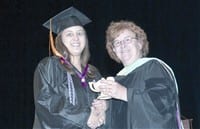Fertile Field For The Future Elms Program Preps Individuals For Work As Legal Nurse Consultants
Katherine Currier says the market for legal nurse consultants (LNCs), especially in Western Mass., remains unremarkable.
In fact, she advises those who enroll in a certificate program in that field at Elms College to do so knowing that it may be some time before they’ll be able to quit their day jobs, as she calls them, in nursing.
But Currier, chair of the Division of Business and Law at the Elms, sees a much better future for this field, in which registered nurses blend their skills in health care with some acquired knowledge of the law to become valued advisors to lawyers, insurance companies, and individuals facing life care planning issues.
“Given the litigious nature of our society and the aging of America, I believe there are going to be some great opportunities in this field,” Currier told The Healthcare News. “One of the big hurdles right now is awareness — many lawyers, especially in this area, don’t know how valuable these individuals can be, and how much they can save them in terms of time and money.”
Creating awareness is one of Currier’s goals as she moves forward with the LNC program, which provides individuals with skills that will form an attractive package for that day — which is probably not too far off — when demand for people with both medical and legal backgrounds will grow.
The Healthcare News takes a look this month at this emerging field, and how the Elms program, one of the few in the Northeast, can position individuals for that day when the market improves.
Case in Point
Currier stressed repeatedly that there are several LNCs enjoying success in the Pioneer Valley — just not enough for her to aggressively market her program or to push enrollment to the point where the supply of graduates would far exceed the demand.
The program has averaged a handful of graduates each year since it was started in 1999, and Currier expects those numbers to climb as the number of health care-related cases grows, and as more law firms and insurance companies understand the value of an individual who can not only read a medical chart, but also gauge a case’s merit and prepare for a deposition.
Citing nursing home cases as but one example, Currier said many new and different types of claims are being brought by individuals and their families as health care technology advances, the population ages, and juries award large settlements.
“Ten years ago, when someone was 80 and they died in a nursing home, people basically said, ‘that’s too bad; I guess it was his time to go,’” she said. “But recently, there have been some huge settlements — millions of dollars — for people in their 70s and 80s for failure to be properly treated in nursing homes.
“There’s a whole new field of law-related, health care-related areas that our society is going to be compelled to deal with,” she continued. “That’s why I think someone with a foot in both camps — health care and the law — will become invaluable.”
This was the thinking behind the creation of the LNC certificate program, said Currier, noting that the Elms also has a paralegal program as part of its Division of Business and Law, and has been working in recent years to create a number of interdisciplinary initiatives.
The LNC program was designed to attract experienced nurses — students must be licensed to practice as registered nurses — who are looking to either branch into a new type of health care field or supplement their work in nursing with something intriguing and somewhat entrepreneurial.
Indeed, to succeed in this field, individuals must be able to sell themselves and their talents, she said, adding that in this respect, the LNC is different from a nurse or a paralegal, who both have job opportunities aplenty.
| “Given the litigious nature of our society and the aging of America, I believe here are going to be some great opportunities in this field. One of the big hurdles right now is awareness.” |
Currier told The Healthcare News that the LNC, working as either an in-house employee or independent consultant, can provide a wide range of professional services. These include interviewing clients; screening cases for merit; analyzing and summarizing medical records and other evidence; researching and evaluating medical literature; assisting in preparation for and evaluation of depositions; identifying, locating, screening, and consulting medical experts; and preparing exhibits for settlement hearings and trials.
LNCs are often called to testify themselves, she added, noting that they are often called upon to explain and evaluate the necessary standards of nursing care.
To prepare RNs for such work, the LNC certificate program features six courses, totaling 19 credits, that include An Introduction to Legal Studies, Principals of Litigation, Personal Injury Law, and Research & Writing. This introduction to the law, coupled with an RN’s vast experience in health care, will often make the LNC more valuable in medical cases than both a typical paralegal or a nurse who has not taken courses in the law, said Currier.
One obstacle to the growth of this field is awareness of the value of an LNC, said Currier, or, in this case, the lack thereof. She said that while the concept has caught on in larger metropolitan areas, including Boston, its acceptance has been slower in Western Mass. and elsewhere. She attributes this to a number of factors, including volume of medical malpractice cases, lack of awareness, that aforementioned frugality on the part of many lawyers, and a general lack of business skill among many in the legal profession.
Indeed, recalling one lawyer she knows who has E-mail messages printed out by staff members and then dictates responses to them, Currier said some lawyers could make much better use of their time, resources, technology, and, in the case of the LNC, a new kind of resource.
“Many lawyers will say, ‘I can read these medical records myself,’” she explained. “Sure they can, but let’s say it takes them 10 hours to do it. If the legal nurse consultant can it in three, and in another hour prepare a report, given her billable rate versus the attorney’s billable rate, he could be using his hours for something he can bill out at. But attorneys aren’t taught any of that in law school.
“One of the things we need to do is let lawyers know that this type of individual exists,” she continued. “If human resource managers in the big insurance firms and other places really thought about it for two minutes, they would see that this is a great opportunity to get someone in with a tremendous range of skills. But this is new, and it’s something people don’t really know about.
Final Arguments
Currier, who has seen demand for paralegals explode in recent years as law firms discover that these individuals can perform many of the tasks that lawyers can, and for a fraction of the cost, believes this same phenomenon will create a strong market for legal nurse consultants.
That day isn’t here yet, she said, and for a number of reasons. But it is coming, and nurses who take the initiative and marry their backgrounds in health care with some knowledge of the law can open doors to many career opportunities.



Comments are closed.